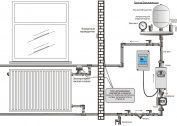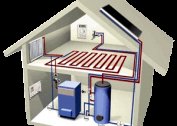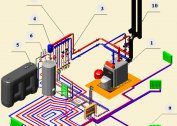As a rule, pipes and water are present in heating systems. Time spares nothing, and as a result, pipes begin to rust under the influence of water. The rusted areas fall off, and under the influence of water pressure, the spalls are carried through the pipes until they are stopped by a bend or something else. But in plastic pipes this is not, but there are problems here: when water is heated, a limestone formation and something like sediment form on the pipe walls. With strong heating, the water evaporates quickly, because of this it is necessary to add it continuously. This, in turn, only accelerates the occurrence of sedimentary processes.
The smallest organisms with their waste products, which have every chance of flourishing in such systems, especially during the period when the heating is turned off, are also the main causes of pipe clogging. Their presence is indicated by the formation of a dark precipitate at the base of the pipe, which, in turn, can be considered a source of clogging.
Consequences of clogging
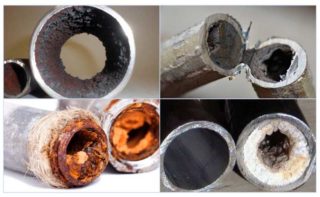 Regardless of what the source of clogging of the heating pipe is, the outcome is almost always the same:
Regardless of what the source of clogging of the heating pipe is, the outcome is almost always the same:
- after a certain moment the pipes become clogged;
- the movement of water in the pipes decreases and later even a water pump cannot pump water through this system.
Thermosiphon heating, where there is no such pump, is much worse. As a rule, heat is not allowed after clogging and the pipes remain cold. And this is only part of the trouble. In addition, the boiler itself begins to heat up very much, which can lead to its breakdown.
Some owners annually clean the blockages of such a system by changing the water. In other words, the old unclean, rusted water is drained and filled with new. And this is reasonable, because when the former water is drained, a small amount of chips and rust leave it. But there is an opposite side. For the appearance of rust, iron and oxygen are necessary. If the pipe is metal, then iron is always present in it, but oxygen is contained in water. As a rule, when you do not change the fluid in the heating system for a long time, the oxygen content in it decreases significantly, which means that the rusting process stops. With a constant change of water, on the contrary, its activation occurs. To summarize, one thing can be said - this method helps to get rid of a small amount of rust, but, on the other hand, we only accelerate the new process of its formation.
Rust control
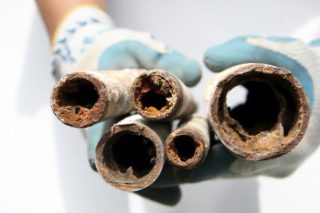 In order for the rust not to spoil the heating, it is necessary to prepare the system for launch in advance. For this purpose, it is necessary not only to fill the water into the pipe, but to add a special antifreeze to it. Its action is the same as in a machine fluid, that is, it guarantees good heat transfer through pipes, and also forms a protection of metal surfaces from oxidative processes and prevents the occurrence of calcareous deposits and other deposits. Such an alternative is quite expensive, but it makes it possible to forget about constant cleaning.
In order for the rust not to spoil the heating, it is necessary to prepare the system for launch in advance. For this purpose, it is necessary not only to fill the water into the pipe, but to add a special antifreeze to it. Its action is the same as in a machine fluid, that is, it guarantees good heat transfer through pipes, and also forms a protection of metal surfaces from oxidative processes and prevents the occurrence of calcareous deposits and other deposits. Such an alternative is quite expensive, but it makes it possible to forget about constant cleaning.
The entire stage of cleaning is relatively simple and does not require the use of complex techniques. The process will be as follows:
- pipe cleaning;
- cleaning the boiler itself.
Pipe cleaning
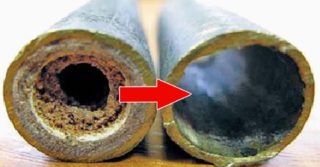 The easiest method of cleaning the heating system is the use of chemicals. All we need is to buy a tool that can dissolve rust and other types of deposits.
The easiest method of cleaning the heating system is the use of chemicals. All we need is to buy a tool that can dissolve rust and other types of deposits.
As a similar remedy, ordinary citric acid, which every housewife has, can act. It must be dissolved in water, it is advisable to use a three-liter jar, since a large amount gives a greater effect.All this solution must be poured into the heating system. Subsequently, it is immediately necessary to light the boiler, set the temperature to a high mark, and it remains to wait twenty-four hours. Later we drain this water. We flush the pipes by filling and re-draining clean water.
Another similar technique is the use of food vinegar. To achieve the best effect, it needs a lot. But there is also a more win-win option - the use of hydrochloric acid is predominantly 10 or 20%. Such a chemical cleans pipes perfectly. But you need to be careful with this substance, since too high a concentration can significantly damage the heating system.
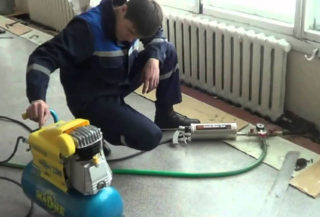 Such an operation is only suitable for small blockages. If the pipes are thoroughly clogged, then the compressor will help out. Most often, this method is called hydropneumatic cleaning.
Such an operation is only suitable for small blockages. If the pipes are thoroughly clogged, then the compressor will help out. Most often, this method is called hydropneumatic cleaning.
The process will be as follows:
- we connect the compressor to the heating system;
- we connect the compressor to the pipe and start;
- flushing begins with a simultaneous combination with pneumatic shock;
- disconnect the pipe going into the boiler (bottom);
- we put some containers near it so that dirty water flows there;
- clean water must constantly flow into the riser (unclean during discharge).
A compressor is expensive and if you don’t want to spend money, you can use the dismantling of radiators (each separately). That is, their washing under huge pressure of water.
Boiler cleaning
Deposits can also be in the boiler itself. In addition, there are more of them here than in pipes. The fact is that it heats up very strongly, due to which the process accelerates.
Chemicals are used here. All the work is quite simple: you need to disconnect the heating pipes, take a pump, which is combined with the boiler and water is let in through it, with chemistry added in advance. We drain all dirty water and then rinse with clean water.
Having mastered all the tips reviewed, you can completely independently flush the heating system yourself.
